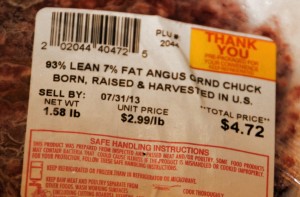
By John Crabtree, johnc@cfra.org, Center for Rural Affairs
Americans overwhelmingly support Country-of-Origin-Labeling (COOL). America’s COOL law requires that retailers inform consumers about the country where beef, pork, lamb and certain other agricultural products were produced.
In 2009 Canada and Mexico challenged COOL provisions related to muscle cuts of beef and pork as an alleged barrier to trade. They argued that the cost of implementing COOL discouraged U.S. meatpackers from purchasing livestock of non-U.S. origin and as a result, reduced the prices of those livestock imports.
But a new study shows that economic downturn, not COOL, caused a decreased demand for cattle imports into the U.S.
The study by Auburn University Professor C. Robert Taylor, Ph.D. demonstrates that COOL did not cause declines in Canadian and Mexican livestock exports to the U.S., but was implemented at the same time that the recession reduced consumer demand for higher-priced cuts of meat.
Previous studies conducted on behalf of Canadian interests claimed COOL resulted in the loss of $1.4 billion in U.S. sales. But Taylor’s study differs greatly from Canadian studies. It’s more detailed and exhaustive and it’s based on Mandatory Price Reporting data as reported by U.S. beef packers to the Agricultural Marketing Service of the USDA. The Canadian studies failed to consider this data.
Farmers and ranchers are proud of the food they put on American dinner tables and support the current COOL labels that allow consumers to make more informed food purchasing decisions.








